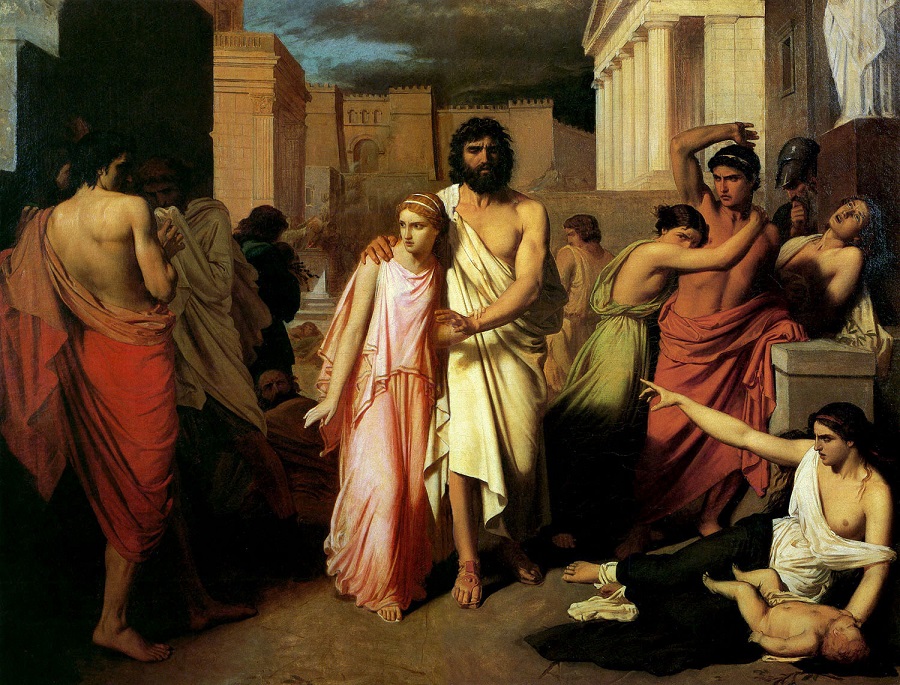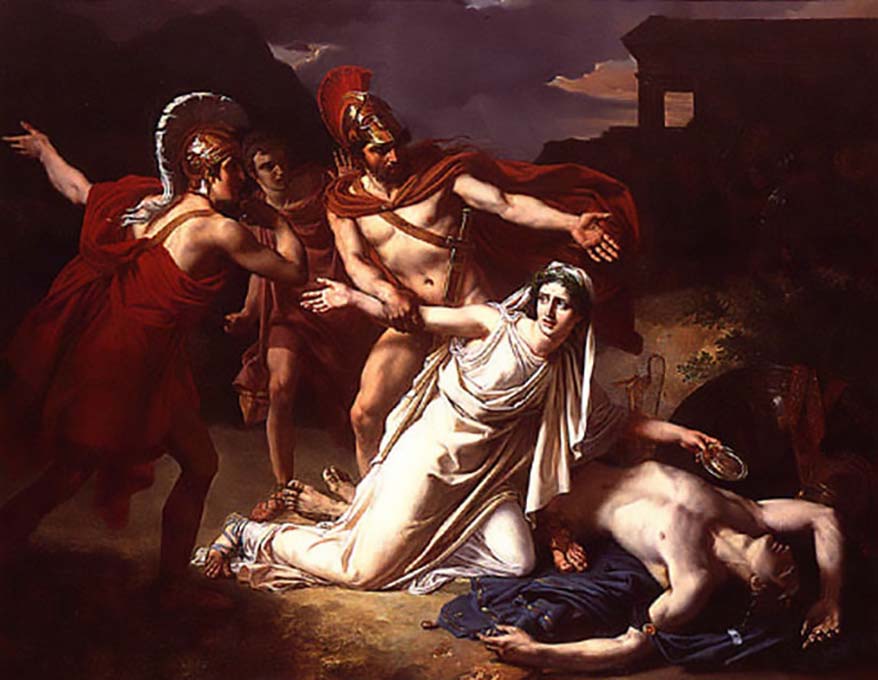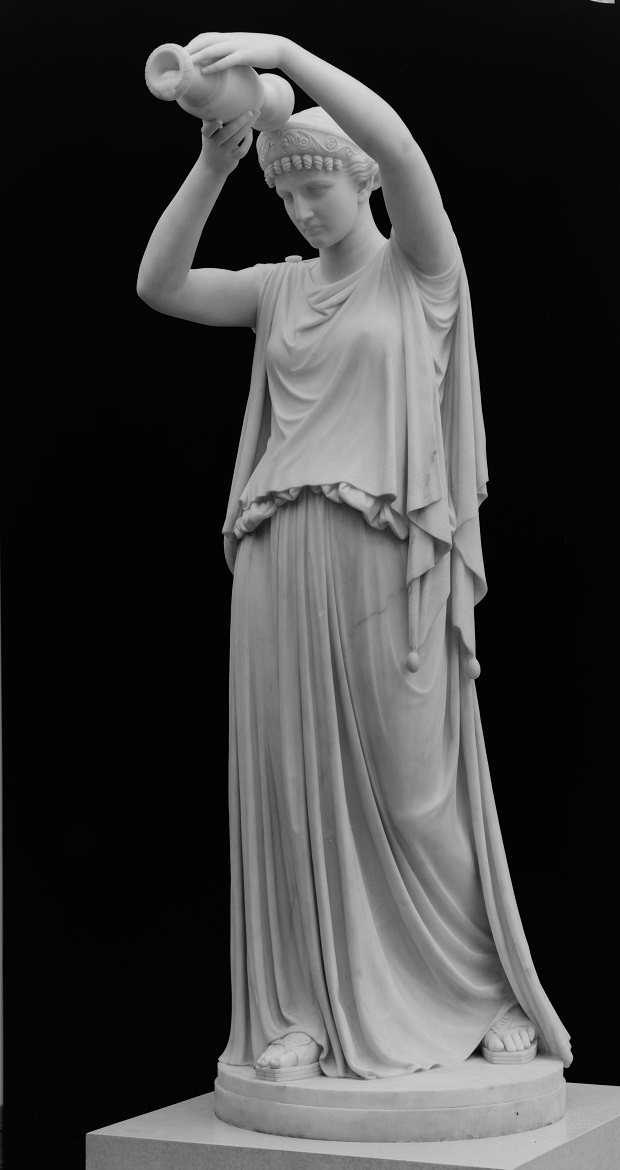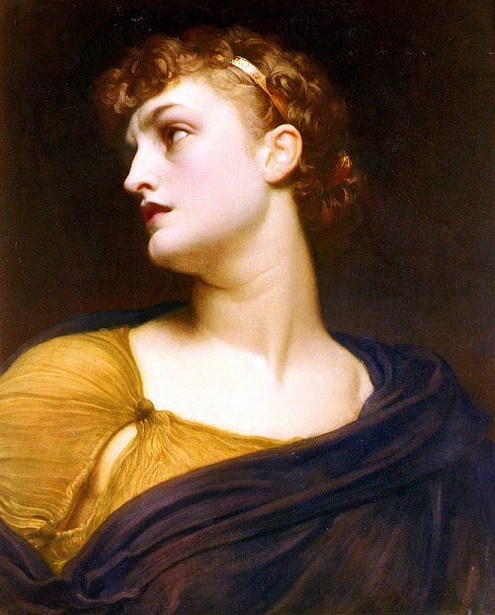Antigone
In Greek mythology, Antigone was the daughter of Oedipus, king of Thebes, and Jocasta. A faithful daughter and sister, Antigone was the main character in a tragedy by the Greek playwright Sophocles.
Euripides, another dramatist of ancient Greece, presented a different, and happier, version of her life. Another version of Antigone’s life comes from Hyginus.
In more recent times, Antigone has been the inspiration for several playwrights and composers.
Sophocles' Story
In Sophocles' earlier play, Oedipus Rex, Oedipus had unknowingly murdered his father and married his mother, Jocasta. This relationship would bring forth four children, Polynices, Eteocles, Ismene and Antigone.
Oedipus would rule the city of the Thebes, but when his crimes were discovered, for he had unwittingly killed his father, as well as slept with his mother, Oedipus would be exiled from his kingdom by his own sons.
As if all that was not enough, Jocasta hanged herself and Oedipus blinded himself.
Antigone and her sister Ismene accompanied their blind father during his wanderings around Greece; and would eventually find refuge in Colonus, a deme of Athens (or, depending on the source, it was only Antigone that followed Oedipus).
Here, Oedipus was visited by Polynices, for the brother of Antigone, now sought his father’s assistance, for a war was imminent between Eteocles and Polynices, but Oedipus cursed his sons to kill themselves.
The reason for the imminent war was that: Eteocles broke his promise to share power with Polynices and drove him from the kingdom as well. Polynices decided to lead an army against Thebes to regain the throne.
Polynices seems to have been the favoured brother of Antigone, for Antigone would try and convince her brother that no good could come from a war between brothers, but the words of Antigone were to no avail.

Apart from it, their uncle, Creon, supported Eteocles in the conflict with his brother. An oracle told Creon that whoever gave shelter to Oedipus would win the battle for Thebes.
Creon therefore asked Oedipus, who had taken refuge in the city of Colonus, to return. When Oedipus refused, Creon sent soldiers to seize Antigone and Ismene to force their father to come back. Theseus, king of Athens, rescued Antigone and Ismene.
Oedipus would die in Colonus, and now no longer required as guides, his daughters returned to Thebes.
Antigone returned to Thebes at the time of the war of the Seven Against Thebes, where Polynices and his allies sought to wrest the throne of Thebes from his brother. The war was a disaster for all sides though, and ultimately the words of Oedipus came true, for Polynices and Eteocles did indeed kill each other.
When the fighting had ended, Creon, who was now regent of Thebes once again, enacted a new law, which forbade the burial of those who had attacked Thebes.
In other words, Creon gave Eteocles a hero's burial but refused to let anyone bury Polynices, whom he considered a traitor.
Hence, the brother of Antigone, Polynices, lay unburied upon the battlefield, and without proper funeral rites, the soul of Antigone’s brother could not pass into the Underworld.
Antigone thus decided to ignore the new Theban law, and in the darkness of night Antigone buried Polynices, although some say that Antigone built a funeral pyre for her brother.
Ultimately, Antigone was caught breaking Creon’s law, and Antigone was thus brought in front her uncle, where she admitted knowing about the law and ignoring it; for in her defence Antigone argued that divine law, or the law of the gods, was to be put ahead of any man made laws.
Despite her impassioned defence Creon has no sympathy for his own niece, and has Antigone locked in a tomb, where of course she will die. Creon's son Haemon, who was engaged to Antigone, pleaded in vain for her life.
Eventually, a prophet (Tiresias) came to see Creon. He warned that the king had angered the gods by sealing up Antigone and refusing burial to Polynices. Creon immediately ordered that Polynices be buried and went to the cave to release Antigone. On opening the cave, however, he found that Antigone had hanged herself.
Haemon was overcome with grief. He tried to kill his father and then stabbed himself to death. When Creon's wife, Eurydice, learned of her son's suicide, she took her own life.
This is Sophocles' version of events...
Sophocles used the story of Antigone to comment on the conflict between the laws of the state and the laws of the gods. Creon's decree against burying Polynices is shown to be unjust and against the gods' wishes. Antigone's decision to perform her religious duty to her brother wins the sympathy of the audience.

Euripides' Version
Euripides' version of the story has a happier ending. In his play, Creon instructed Haemon to carry out Antigone's sentence. Haemon pretended to seal Antigone away as ordered but actually took her to the countryside. The couple stayed in hiding for many years, raising a son.
After the son grew up, he went to Thebes to take part in an athletic event. There he stripped off his clothes to run in a race and revealed a birthmark (the Spartoi, symbol of the dragon) that was found only on members of Antigone's family; Creon recognized the mark and sentenced Haemon and Antigone to death for disobeying his orders.
The god Dionysus (Bacchus) pleaded with Creon to spare their lives (in some versions of the story, Hercules is the one who pleaded for them). Creon agreed, and the lovers were formally married.
Hyginus' Version
Hyginus version is very similar to Euripides' version with one main difference.
Instead of getting a happy end, what we get is an ending that goes like this: despite the intercession of Heracles, Creon refuses to back down, and so Haemon kills Antigone and then kills himself.
Antigone – The sister of king Priam
There is another famous person that goes with the name of Antigone.
In this case, Antigone was the sister of Priam (the famous king of Troy). Antigone was extremely beautiful but she was also very arrogant (due to her beauty).
Eventually, her arrogance reached the point in which she claimed that her hair was even more beautiful than that of the goddess Hera.
Hera punished her arrogance by turning Antigone’s hair into snakes.
Ultimately, the other gods took pity on Antigone and transformed here into the bird that is said to be the enemy of snakes, namely, to a Stork.














